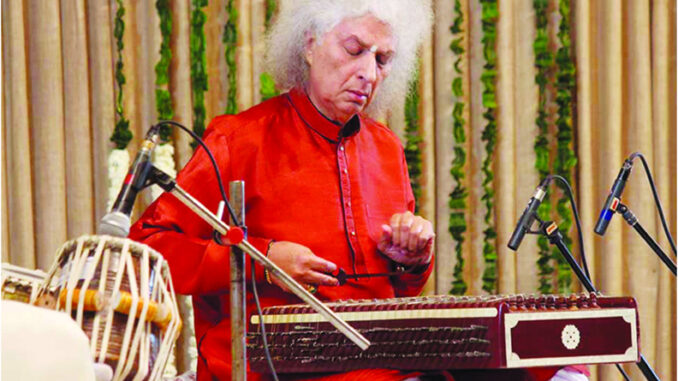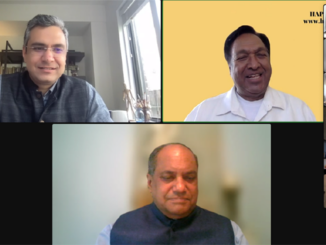
It’s common to use words such as ‘legendary’, ‘greatest’, and ‘iconic’ to describe the life and times of illustrious artists. In most cases, the tributes are often befitting, and if anything, the words fall short, but how does one find words to summarise a stalwart such as Pandit Shiv Kumar Sharma. One of the all-time greats in every sense of the word, Pandit ji was more than an exponent of Hindustani classical music. His death on 10 May 2022 at 84 from a cardiac arrest – Pandit ji had suffered kidney failure and had been undergoing dialysis for a while – marks not just the end of an exemplary career but also the end of an incredible journey that elevated the santoor. Born in Jammu on 13 January 1938, Shiv Kumar Sharma’s family was instrumental in reviving the santoor’s fortunes and popularising it. Pandit ji’s father, Uma Dutt Sharma, a renowned vocalist, became obsessed with the santoor, which at the time was mostly associated with Kashmir folk music and an accompaniment to Sufi vocals. He entrusted the young Shiv Kumar Sharma with the mission to make the strains of the santoor be heard across the world.
Like his father, Shiv Kumar Sharma also played the tabla, but it was the santoor that he committed his life to and gave it mainstream recognition and acceptance. Pandit ji made several modifications to the basic santoor — he extended its range to a full three octaves and ‘created a smoother glissando to allow the player to sustain and slide between notes in perfect emulation of the ‘human voice.’ He also developed a style of performing all the ragas and also created ‘rhythmic intricacies.’
For a film-crazy nation such as ours, once a musician is associated with film music, much of their ‘other’ work often remains underappreciated or under-celebrated. Pandit Shiv Kumar Sharma was a rare exception. He composed the background score for a few scenes in V Shantaram’s Jhanak Jhanak Payal Baje (1955) and soon became one of the most sought-after session players for leading music composers. SD Burman also insisted that Pandit ji play the tabla on Guide’s (1965) ‘Moh se chhal.’ Through the 1960s and 1970s, Pandit ji toured the world and recorded his first solo album Santoor & Guitar, with Brij Bhushan Kabra. A few years later, Shiv Kumar Sharma collaborated with the equally illustrious Pandit Hariprasad Chaurasia on the epoch-making Call of the Valley (1967), which became platinum. The album remained one of the highest selling Indian classical records of all time and a perennial favourite of several musicians, including Bob Dylan. Three decades later, both Shiv Kumar Sharma and Hariprasad Chaurasia came out with the sequel, The Valley Recalls — In Search of Peace, Love & Harmony.
In the 1980s, Pandit Shiv Kumar Sharma and Pandit Hariprasad Chaurasia collaborated to compose film music, starting with Yash Chopra’s Silsila (1981). The two came to be known as ‘Shiv-Hari’, and ushered in a new chapter in film music in the 1980s, a decade that needed all the inspiration in the world. Pandit Shiv Kumar Sharma’s film work might have introduced him to a broader audience, the kind who might not have approached classical music on their own. Still, unlike the norm, Pandit ji did a greater favour to India’s popular culture than what it could have possibly offered him.
This was an era where RD Burman, Laxmikant-Pyarelal and Kalyanji Anandji were the first names that came to mind when thinking of film music. Shiv-Hari’s compositions in Silsila were rooted in classic Indian melody and were blessed with an arrangement style that made it accessible. One would have imagined that Yash Chopra took a significant risk with the two. Younger composers such as Rajesh Roshan were breaking new ground, and the understated Khayyam and Jaidev were in a league of their own. Still, Chopra went ahead with the two, and Silsila broke new ground in more ways than expected. For one, it had Javed Akhtar’s lyrics, an experiment as good as any, and featured Amitabh Bachchan’s vocals on many tracks, but Shiv-Hari merged the best of all worlds to come up with an album that remains one of the best in the history of Hindi films.
Silsila’s commercial failure made Shiv-Hari a somewhat ‘exclusive’ brand. In Hindi films, a film’s inability to set the cash registers ringing often leads to the talent associated with it getting blamed. In any case, Shiv-Hari were not the kind of composers that would chase producers, but one wonders if Silsila and the subsequent Chopra releases, Faasle (1985), a platinum disc in terms of sales, and Vijay (1988), the lowest ebb in Yash Chopra’s career, had been triumphant would it have changed the course of Pandit Shiv Kumar Sharma and Pandit Hari Prasad Chaurasia’s film works. Their biggest success in films was Chandni (1989). This film revived the career of Yash Chopra and also contributed to the revival of melody in film music along with Anand-Milind’s Qayamat Se Qayamat Tak (1988) and Raam-Laxman’s Maine Pyar Kiya (1989).
Shiv-Hari composed music for two more Yash Chopra films — Darr (1993) and Parampara (1993) — both were action-dominated scripts, but the music did exceptionally well. The last film that they collaborated on was Sahibaan (1993). While fans of Shiv-Hari might not rate either Darr or Parampara highly, the two albums had songs that weren’t standard Shiv-Hari compositions but completed the bouquet of their film sojourn. Parampara’s ‘Aadhi raat ko’ and the Qawwali ‘Mujhe ishq ho gaya’ (both penned by Anand Bakshi) are vastly underrated. While Darr’s ‘Jadu teri nazar’ remains eternally popular, thanks to being Shah Rukh Khan’s breakthrough, it’s the perfect cocktail of melody and an underlying fear in ‘Tu mere saamne’ (Udit Narayan, Lata Mangeshkar, Anand Bakshi) that speaks volumes about Shiv-Hari.
When one looks back at Pandit Shiv Kumar Sharma’s life, one sees how he shall remain an integral part of our conscious memory. What more could an artist ask than his name being synonymous with the instrument he played. A true crossover artist, Pandit ji created a sound that shall remain unparalleled and as unique as one can imagine. (Source: Firstpost)
The writer, Gautam Chintamani, is a noted film historian and author.
Soulful music tracks composed for Bollywood movies : Beginning with a background score for Shantaram’s ‘Jhanak Jhanak Baje Payal’, Pandit Shiv Sharma went on to compose music for several films directed by filmmaker Yash Chopra, including ‘Silsila’, ‘Lamhe’ and ‘Chandni’.
Pandit Shiv Kumar Sharma and Hariprasad Chaurasia began their collaboration under the name Shiv-Hari and recorded their first album titled ‘Call Of The Valley’ in 1967. The duo teamed up for around 8 Bollywood movies from 1981-1993. They even bagged four Filmfare Awards in the ‘Best Music Director’ category for Yash Raj Films’ ‘Silsila’, ‘Chandni’, ‘Lamhe’ and ‘Darr’. Here is a list of the songs composed by the legendary duo Shiv-Hari, that breathed a fresh air into Bollywood music:
Rang Barse Bhige Chunar Wali (Silsila)
This lively song infused with the festive fervour gives Holi, the festival of colours, a different meaning altogether. The music perfectly blends with Amitabh Bachchan’s masculine voice. This song is still a must on the occasion of Holi.
Tere Mere Hotho Pe… (Chandni)
The soulful romantic track featuring late actors Rishi Kapoor and Sridevi in the exotic and picturesque landscape of Switzerland is still one of the favourites for music lovers and die-hard romantics. There could not have been a better rendition of this iconic song.
Mere Haathon Mein Nau-Nau.. (Chandni)
Remembered as one of the most iconic songs of late Sridevi, the song is infused with a different energy. Lata Mangeshkar’s voice and music by Shiv-Hari is a perfect blend of passion, longing and notoriety.
Jaadu Teri Nazar, Khushbu… (Darr)
Marking Shah Rukh Khan’s iconic performance in a negative role, the film received equal accolades for its soulful music. The duo Shiv-Hari went on to win the Filmfare Award in the ‘Best Music Director’ category.
Dekha Ek KHwab To Ye… (Silsila)
The film starring Amitabh Bachchan, Rekha, Jaya Bachchan and late Sanjeev Kumar, still remains a blockbuster for its gripping storyline and its iconic music score. The song ‘Yeh Kahan Aa Gaye Hum’ still has the power to transport the listener in a valley full of tulips while the song ‘Rang Barse’ makes everyone groove. ‘Dekha Ek Khwab To Ye Silsile Hue’ is a track that is liked by love-struck couples, even today.





Be the first to comment